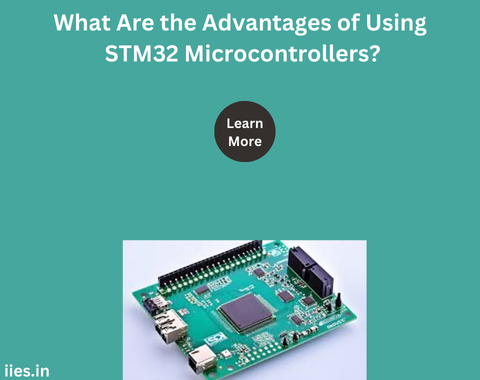1. Wide Range of Product Lines
STM32 microcontrollers come in multiple product lines, each designed to cater to different needs and applications. These include:
- STM32F: General-purpose microcontrollers that offer a balance of performance and power efficiency.
- STM32L: Ultra-low-power microcontrollers ideal for battery-powered applications.
- STM32H: High-performance microcontrollers suitable for complex and demanding tasks.
- STM32G: General-purpose with advanced analog features for sensor and control applications.
This variety allows developers to choose the right microcontroller for their specific project requirements.
2. High Performance
STM32 microcontrollers are built around ARM Cortex cores, such as Cortex-M0, M3, M4, M7, and M33. These cores provide excellent computational power, enabling efficient processing for real-time applications. The high clock speeds, combined with advanced peripherals, allow STM32 microcontrollers to handle demanding tasks with ease.
3. Low Power Consumption
Power efficiency is crucial in many embedded applications, especially for battery-powered devices. STM32 microcontrollers offer various low-power modes and features, such as dynamic voltage scaling, to optimize power consumption. The STM32L series, in particular, is designed for ultra-low-power applications, making it ideal for IoT devices and wearable technology.
4. Rich Peripheral Set
STM32 microcontrollers boast an extensive array of peripherals, including:
- Timers: For precise time measurements and event counting.
- ADC/DAC: For analog signal processing.
- Communication Interfaces: Such as USART, SPI, I2C, CAN, USB, and Ethernet.
- GPIO: General-purpose input/output pins for interfacing with other hardware components.
These peripherals enhance the functionality and flexibility of STM32 microcontrollers, allowing them to interface seamlessly with various sensors, actuators, and communication modules.
5. Development Ecosystem
STMicroelectronics provides a comprehensive development ecosystem for STM32 microcontrollers. This includes:
- STM32CubeMX: A graphical tool for configuring microcontroller settings and generating initialization code.
- STM32CubeIDE: An integrated development environment for coding, debugging, and testing applications.
- STM32CubeMX Libraries: HAL (Hardware Abstraction Layer) and LL (Low-Layer) libraries that simplify hardware access and management.
Additionally, there is robust support from the open-source community and a plethora of third-party tools and IDEs, further enhancing the development experience.
6. Scalability
One of the significant advantages of STM32 microcontrollers is their scalability. Developers can start with a lower-end model and seamlessly migrate to higher-end models within the same family, thanks to pin compatibility and consistent software frameworks. This scalability ensures that the investment in development tools and code can be reused across different projects and product lines.
7. Robust Security Features
Security is paramount in modern embedded applications, especially in the context of IoT. STM32 microcontrollers incorporate various security features such as secure boot, hardware cryptographic accelerators, and memory protection units. These features help safeguard against unauthorized access and ensure the integrity of the system.
8. Cost-Effectiveness
Despite their advanced features, STM32 microcontrollers are competitively priced. Their cost-effectiveness, combined with the robust development ecosystem and support, makes them an attractive option for both startups and established companies.

